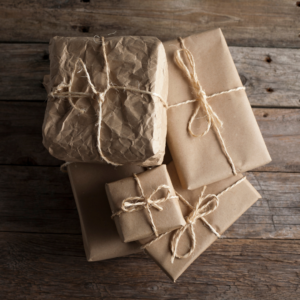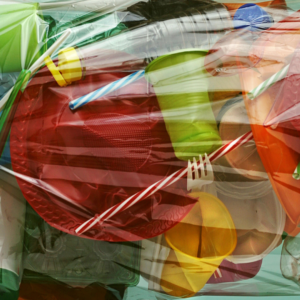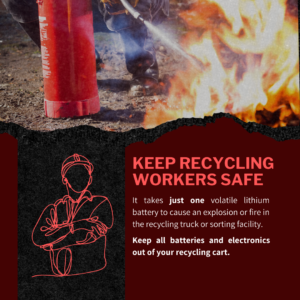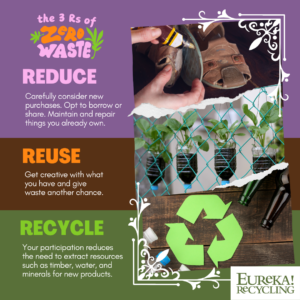 REUSE, RECYCLE, and COMPOST your way to a ZERO WASTE holiday!
REUSE, RECYCLE, and COMPOST your way to a ZERO WASTE holiday!
A 2021 analysis conducted by the Center for Biological Diversity shows that Americans generate 23% more tons of waste in December than in any other month of the year.
- That’s 36 more pounds of waste per person – the equivalent of everyone throwing away seven computer monitors, and
- 5.8 million tons more waste in December than in other months of the year – the weight of 28,713 Boeing 747 airplanes.
We can all reduce holiday waste by concentrating four ways to reuse, recycle, and compost our way toward a zero-waste holiday.
- Be mindful with gift giving; consider buying used or giving an experience. Use recyclable paper or reusable fabric to wrap presents. Save bows, ribbons, gift bags, and wrapping paper for reuse.
- Only cook as much food as you can consume. Have a plan for leftovers. Send guests home with extra food. Compost all food-waste and scraps.
- Avoid disposable plates and utensils, and plastic decorations and tinsel.
- When possible, reuse, recycle, and compost, but, when necessary, be sure to dispose of items correctly. You can download and print our Holiday Disposal Tips Chart or use our What Can I Recycle? tool to help keep your holiday waste at a minimum.
 Gift Giving and Wrapping Tips:
Gift Giving and Wrapping Tips:
Most wrapping paper is not recyclable – and a 2018 analysis by Earth911 estimated that 2.3 million pounds ends up in landfills every year. At the same time, by putting wrapping paper in your recycling cart and “wish-cycling” you could contaminate good recyclable paper. Instead, consider some alternatives to traditional wrapping paper.
- Use newspaper, comics, butcher paper, fabric, or other reusable or recyclable materials to wrap presents and sub natural twine for bows and ribbons.
- Get creative… Giving a kitchen item? add a kitchen dish towel to the gift and use it in place of wrapping paper.
- Avoid gift cards on packages – especially battery operated/musical cards. If you receive one, be sure to take the batteries out before you recycle the paper. Lithium batteries are a fire hazard for recycling vehicles and facilities.
Unwanted gifts are a major source of holiday trash. According to a 2017 YouGovAmerica study, 30% of people threw an unwanted gift in the trash. By being thoughtful about what we give, we can keep some of this waste out of landfills.
- Give the gift of an experience like tickets to the theater, a concert, or a sporting event, or a gift certificate to a favorite restaurant – add free babysitting for parents.
- Purchase and refinish secondhand furniture or clothes.
- Purchase your favorite books used or pass on your own copies.
- Give the gift of fresh baked goods. Bake cookies and gift them in reused/reusable cookie tins
- Help others in need. Instead of a gift, make a donation to a local food shelf or Toys for Tots
Planning a Waste Free Menu:
For many of us, holiday food is the highlight of the season – with leftovers taking a close second. With a little planning, we can reduce the amount of food waste over the holidays.
- Don’t overdo it: Use this Guestimator tool to meal plan and make sure you don’t cook more than you can consume. It even has a setting to determine the amount of leftover meals you want to plan for.
- Think ahead: Turkey, chicken, and ham leftovers can make excellent soups.
- Compost your food scraps: Backyard compost bins take fruit and vegetable scraps, coffee grounds, eggshells, and even egg cartons and some low-grade paper packaging. You can add meat scraps and bones and other food waste to many Twin Cities composting programs. Check with your local composting provider for details.
 Plastics During the Holidays:
Plastics During the Holidays:
Plastic waste is a problem year-round, but the holidays have their own set of particular problems. We can create a more sustainable season by following a few tips on plastic usage.
- Limit or eliminate the use of single serving plastic bottles for soda, juice and water.
- Skip the plastic plates and serving ware. If you must go disposable, look for BPI certified, compostable serving ware.
- Become a straw-free household – or purchase a set of reusable, washable drinking straws.
- Don’t be so fast to discard holiday lights that aren’t lighting up. It could be as simple as replacing one bulb to light up the whole string again. If you do have to discard them, do not put them in your recycling cart. They need to go to a local drop-off location. And, if you replace them, buy LED lights – they are more durable and take less power to light.
Disposal of Holiday Waste:
Although zero waste is always the goal, sometimes we have to dispose of things. Eureka’s Holiday Disposal Tips Chart, and our What Can I Recycle? tool are great ways to stay on top of what can be recycled, what should be reused, and what can go into the compost bin. Below is a list of some items that can become especially problematic during this season.
- Lithium batteries are highly flammable and can start fires in our collection trucks and at our sorting facility. They hide in musical greeting cards, old remote controls, digital timers, and the flameless candles that are so prominent this time of year. Please do not put any kind of battery in your recycling bin.
- Extension cords and holiday lights get wrapped around the machinery at our sorting facility and can damage equipment and injure workers. They should be dropped off at a designated sight. The Recycling Association of Minnesota has a comprehensive guide for holiday light drop-off locations
- Most wrapping paper is too low grade to recycle and may contain other elements like foil or plastic. Bows and ribbons are not recyclable. These items only contaminate loads when they are added to your cart.
- Plastic packing materials, like bubble wrap and air pillows cannot be put into your bin but may be accepted at local plastic shopping bag drop off sites. Check with the site for their guidelines.
Happy holiday season from all of us at Eureka Recycling. We hope you enjoy a cheerful, zero waste holiday and start your new year by committing to careful recycling, thoughtful reuse, eco-friendly composting, and appropriate disposal.
Share this story

Proper Disposal of Batteries and Electronics Keeps Us All Safe
Lithium batteries and electronics that are improperly placed in recycling carts can get compressed or punctured by the equipment we
Zero Waste Event in Mankato Draws 300+ Attendees
In September, we joined our Mankato partners for a celebration of waste reduction efforts. The Minnesota Zero Waste Coalition, Mankato

Trash the Overwhelm and Take Action to Reduce Waste
The United States, which represents just 4% of the global population, produces a whopping 12% of global municipal solid waste.
Minnesota Settles Lawsuit on Deceptive Recycling Labeling
Deceptive labeling impacts our operations daily at Eureka. Companies will often label something as recyclable causing it to end up
